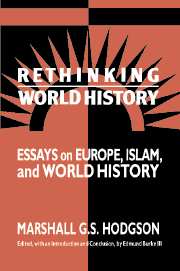Book contents
Conclusion: Islamic history as world history: Marshall G.S. Hodgson and The Venture of Islam
Published online by Cambridge University Press: 18 December 2009
Summary
At a time when orientalism is under attack both from within and without the profession, the publication of Marshall G. S. Hodgson's three-volume work, The Venture of Islam: Conscience and History in a World Civilization, is an event of major importance. So rich is its subject, so complex and ambitious its analytic scheme and serious its moral purpose that it is difficult in brief compass to give an idea of the book. In the following pages, I discuss those aspects of the work that seem to me most important for an understanding of its achievement and significance. In the end, I shall argue, The Venture of Islam must be seen as the most ambitious and successful effort to salvage the orientalist tradition to date.
Having said this, I should add that The Venture of Islam is also a controversial work, one likely to generate continuing debate both on points of detail and on its overall vision of the history of Islamic civilization. Already, it has been criticized as a highly personal and partisan account. Such charges, it must be said, are true, but they are also beside the point. Indeed, the very greatness of the book stems from Hodgson's own personality, his cranky obsession with terminology and presuppositions, his insistence on seeing Islamic civilization in a world historical context, and his stubborn Quaker moral conscience. The rest is scholarly monographs. There is much about Hodgson's spirit that recalls the youthful impatience with mediocrity which so marked the writings of Marc Bloch and Lucien Febvre, the founders of the Annales school.
- Type
- Chapter
- Information
- Rethinking World HistoryEssays on Europe, Islam and World History, pp. 301 - 328Publisher: Cambridge University PressPrint publication year: 1993
- 2
- Cited by

